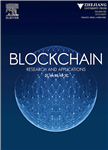The Bisq decentralised exchange: on the privacy cost of participation
作者机构:Institute of TechnologyCarlowR93 V960Ireland
出 版 物:《Blockchain(Research and Applications)》 (区块链研究(英文))
年 卷 期:2022年第3卷第1期
页 面:13-22页
核心收录:
学科分类:08[工学] 0812[工学-计算机科学与技术(可授工学、理学学位)]
基 金:There is no silver bullet to addressing the privacy leaks presented in the previous sections. Both the Bisq Trade Protocol heuristic (Section 3.1) and the Bisq DAO heuristic (Section 3.2) extend the multi-input heuristic that is an effective means of aggregating user activity on the Bitcoin blockchain . A coloured coin system such as Bisq that builds on top of Bitcoin will be subject to this type of analysis. Furthermore the most obvious countermeasures involve obfuscation through additional transactions which incur transaction fees. This is undesirable since transaction fees on the Bitcoin blockchain are expensive and expected to rise.The authors are grateful to the members of the Bisq community and the anonymous reviewers that provided feedback on earlier versions of this article. The research described herein was funded by the President's Research Fellowship Scholarship at the Institute of Technology Carlow
主 题:Decentralised exchange Blockchain analysis Decentralised governance Cryptocurrency Privacy
摘 要:The Bisq Trade Protocol and the Bisq DAO(decentralised autonomous organisation)are core components of Bisq,a decentralised cryptocurrency *** Bisq Trade Protocol systematises the peer-to-peer trading of Bitcoin for other currencies and the Bisq DAO decentralises the governance and finance functions of the entire ***,by following the Bisq Trade Protocol and interacting with the Bisq DAO,participants necessarily publish data to the Bitcoin blockchain and broadcast additional data to the Bisq peer-to-peer *** examine the privacy cost to participants in sharing this ***,we use novel address clustering heuristics to construct the one-to-many mappings from participants to addresses on the Bitcoin blockchain and augment the address clusters with data stored within the Bisq peer-to-peer *** describe address clustering heuristics for both the Bisq Trade Protocol and the Bisq *** show that the heuristics aggregate activity performed by each participant:trading,voting,transfers,*** identify instances where participants are operating under multiple aliases,some of which are real-world *** identify the dominant transactors and their role in a two-sided *** conclude with suggestions to better protect the privacy of participants in the future.



